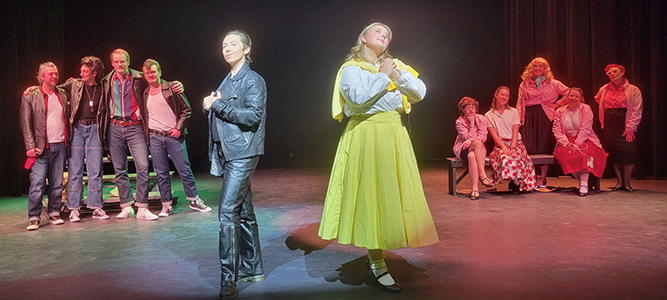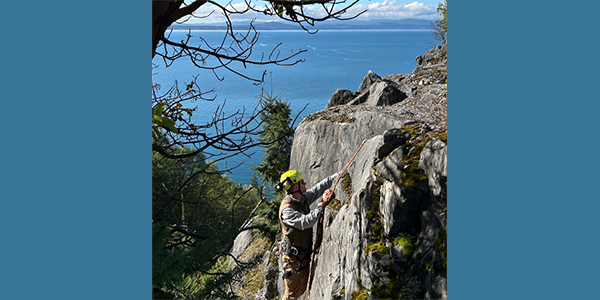||| MIDNIGHT MUTTERINGS BY JACKIE BATES |||
A long time ago when I had a specialty, my specialty was what would today be called ‘gender studies.’ Back then it was called, well, nothing, because such a field did not exist, at least in the august halls of academia, where I had a tentative foothold. Several of my academic advisors (when I mentioned my interest in how physiologically and socially one became and remained male or female; there being no other options at the time) suggested that I no longer mention my interest again, especially when I was applying for jobs. Well, I didn’t mention it to much of anybody for a few decades, but I continued to read and think about the questions in my head.
Now, of course, it is in everyone’s interest to have the correct nomenclature when it comes to gender, and we, as a culture, understand that the establishment of gender is far more complex than we ever imagined in those old, unschooled days.
Still, it seems unusual for one to be as obsessed with gender as I am, without a personal or family experience which makes one aware of the complexities. I have been content with my assignment (and my own self identity) my whole life, though not so impressed with some of the restrictions being born female has caused me and my like-gendered sisters as we have tried to make our ways in a (yep, I’ll say it) male-dominated world.
In my own experience, I was the fourth child and third daughter born to our parents, and if anyone was disappointed in my gender, they never mentioned it to me. Fortunately, very fortunately, our father thought anybody could do anything, and wasn’t much interested in who was too girly to chase the cows back into the pasture when they chose to escape and stand in the road on the coldest morning of any year. And I could, and did. drive a tractor when I was so small I had to walk to the brake in order to keep from driving through the fence that (sometimes) kept the cows in Also, our father wasn’t much interested in who wore the pants at dinner time. Again, anyone who was hungry was qualified to man the frying pan. And wash the dishes.
But tonight I am thinking about reindeer. Ever since Clement Clarke Moore wrote about the eight tiny reindeer pulling Santa’s sleigh through the night on Christmas Eve almost 200 years ago, we have known and not questioned that those small but infinitely tireless creatures each had an elegant set of antlers. And, then as we fast-forward to 1939, we have Robert Lewis May writing a song in which Santa and his team are saved by a ninth reindeer, who, with a red, glowing nose, joined the flying fleet of ruminants and guided them through the dense fog of that particular year. Fog, as I know it, would not be impressed with a single red nose bulb, that that’s not the point here. In addition to the clownish nose, Rudolph has a fine set of antlers like the other reindeer. He also has a gender-specific name which established him as male, in addition to the pronoun Robert L. May used in his song.
Ah, but a couple of decades ago I was in the Scandinavian Arctic and happened upon a reindeer farm. The farmer, a woman, was explaining her work to our little group of stragglers. She said that the critters ran loose until harvest time shortly before Christmas, when it was cold enough that the meat could be kept in sheds without artificial freezers. In addition, she didn’t have to feed so many animals through the winter. She continued that she didn’t harvest the pregnant females so there would be a new crop of animals for the following year. It was late summer when she was speaking and we looked out on the fields where the reindeer grazed. I asked her how she could tell who was pregnant when the calves aren’t born until the following spring.
It’s easy, she said, smiling as though it was a question she heard a lot: Only the pregnant ones have their antlers at harvest time. All the others shed theirs in November.
So that’s the story on Santa: All these years he has been running a group of knocked up babes when he pulls that all-nighter every December 24. After all, looks are everything, and Christmas reindeer need antlers to look the part.
I do hope this year, if you happen to get a glance of Santa and his sleigh, you’ll note and appreciate the work of those fine, four-legged women who have been laboring through the cold night once a year, delivering packages, long before FedEx and Amazon got into the business, antlers or not.
*Note: When I checked the above facts on the almighty internet, I found only that ‘males shed their antlers in November.’ Does that mean that female reindeer have a 100% pregnancy rate each year? Or should we trust the word of the farmer in the far north for the facts of (reindeer) life?
**If you are reading theOrcasonian for free, thank your fellow islanders. If you would like to support theOrcasonian CLICK HERE to set your modestly-priced, voluntary subscription. Otherwise, no worries; we’re happy to share with you.**









I am not sure how I feel about Santa making pregnant women work a long night, as well as the crunchtime the elves are subjected to in order to meet a fixed deadline.
Jackie.
Ahh, how perfect. Love this story. Maybe it can be used in a post- modern gender studies class. ; )
Thanks.
Oh Jackie how I have missed you stories. Love this one.
Great perspective and writing Jackie! Reminds me of the writing group we had a few decades ago. Submit more please!
Thank you for the Great Belly Laugh.
Merry Christmas, from Spirit Eagle.
Great story for me to share with all of my nieces and the other women I know and try to advance. I have always said no one works harder than a mom! Thanks.
Love this!!!
I am an eclectic biological fact nerd, thank you! I knew this about the cervidae, and refreshed some of the finer, factual details.
Delightful write, Jackie – I loved every word of it, and your wonderful sense of humor throughout. I hope you keep writing these – I think of you, and your writing, so often, and miss seeing your face and that wry and impish brain, and smile.
Superb article, great writing. I will share this with friends. Please write more for the Orcasonian and maybe a book?